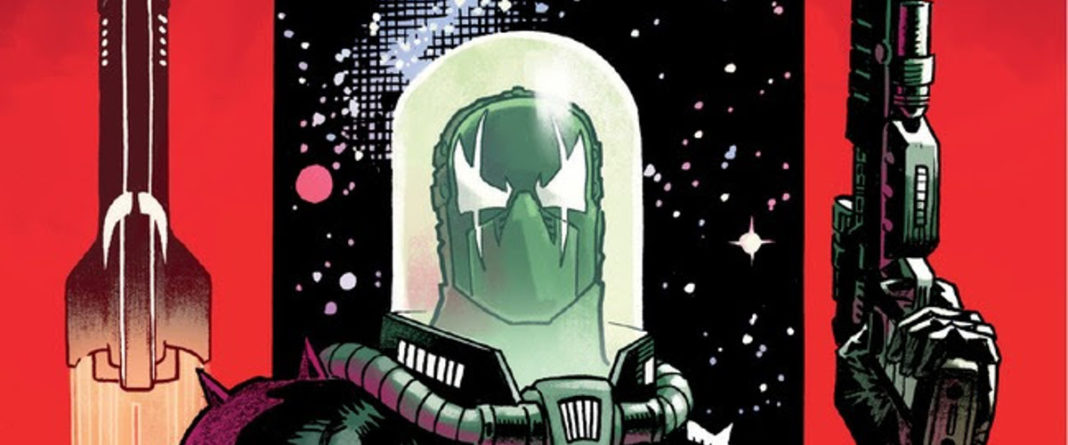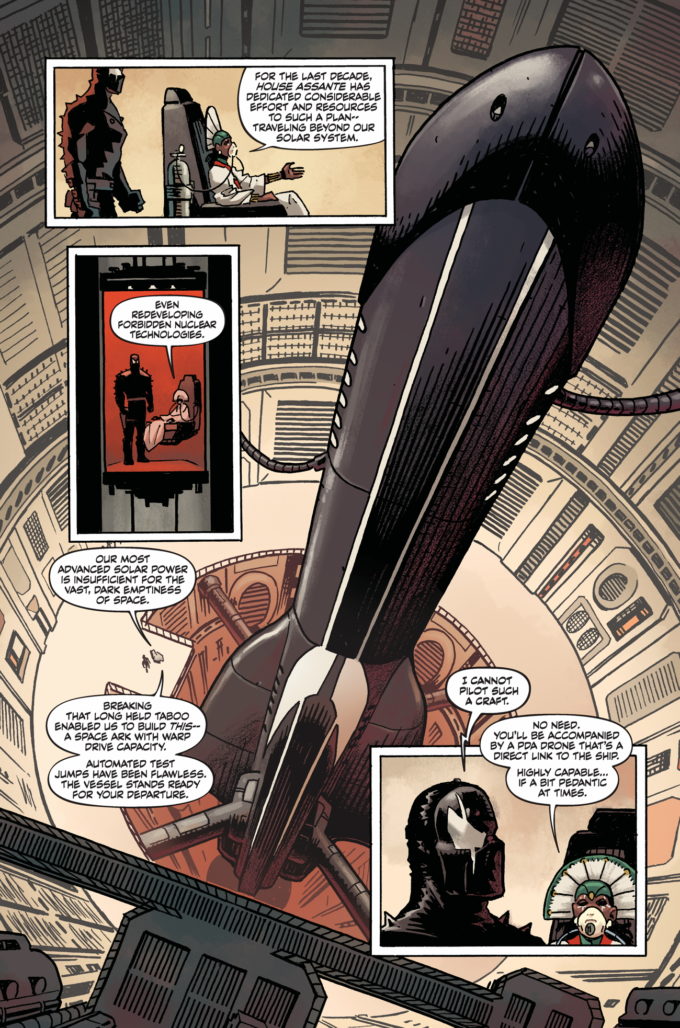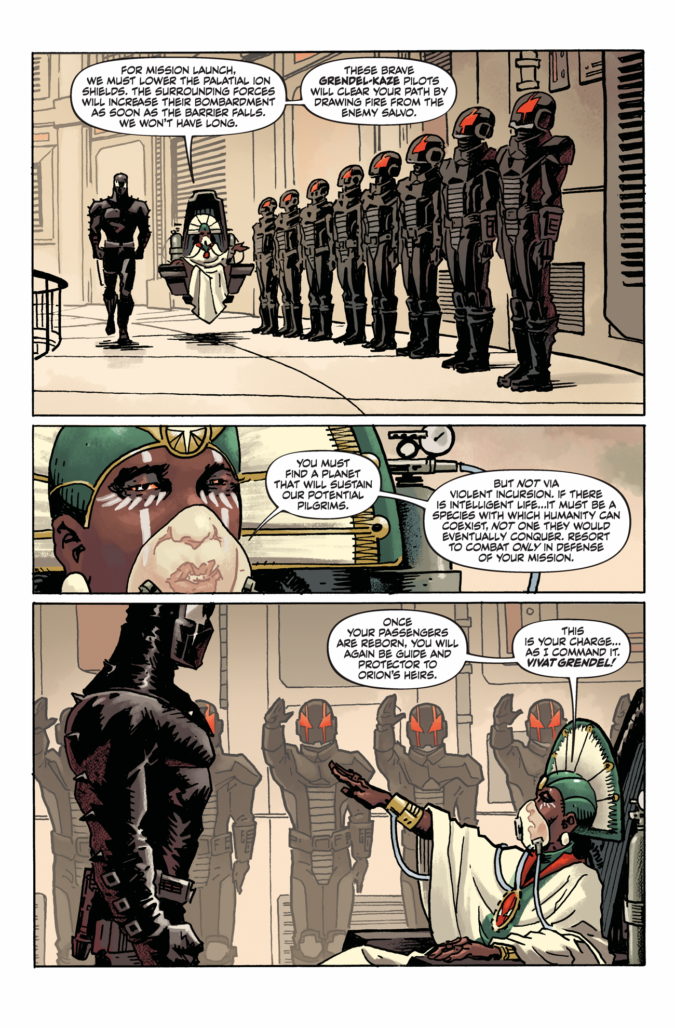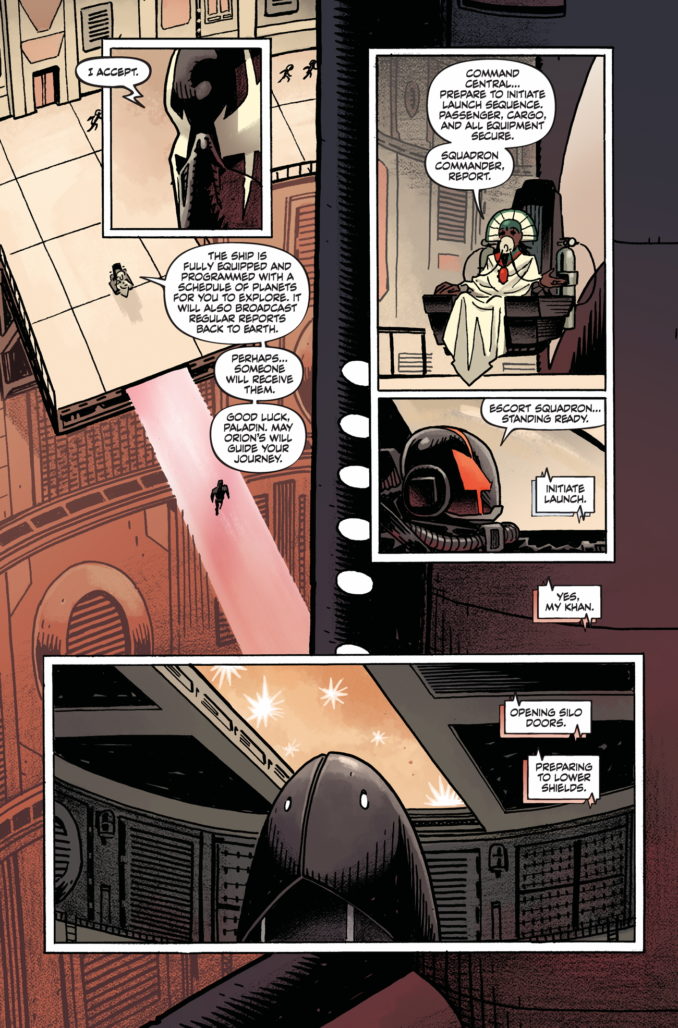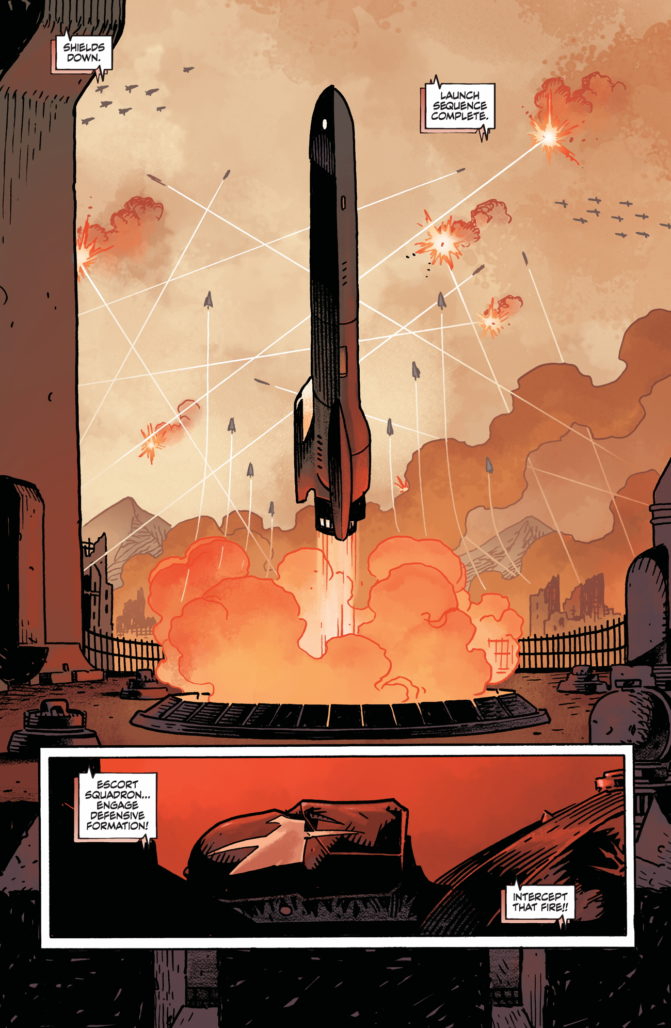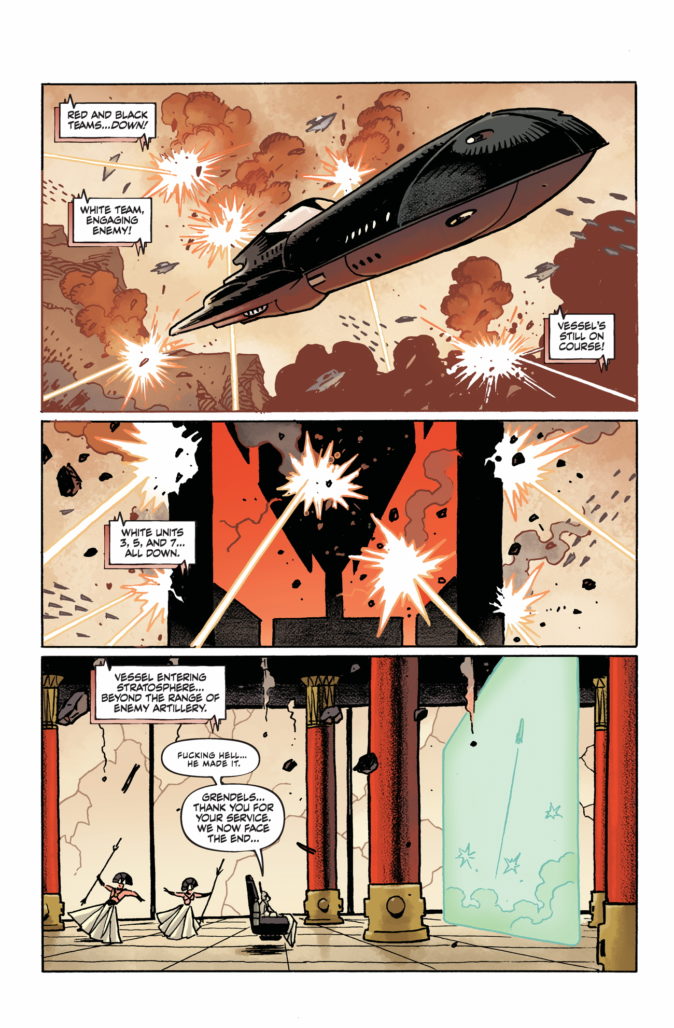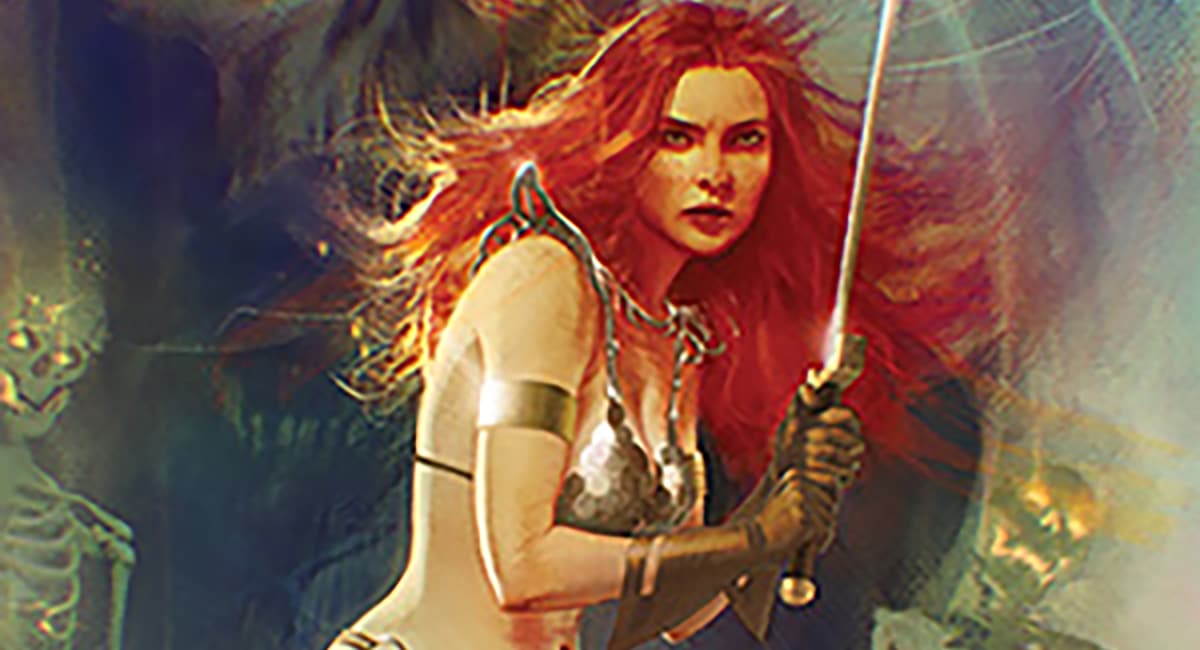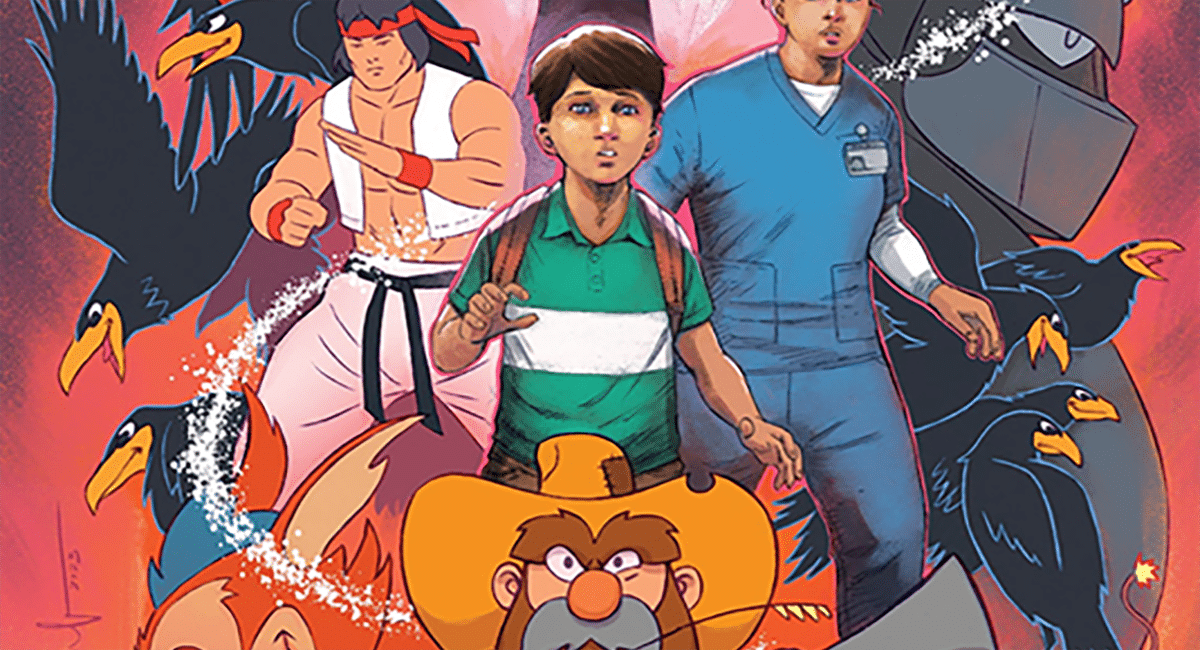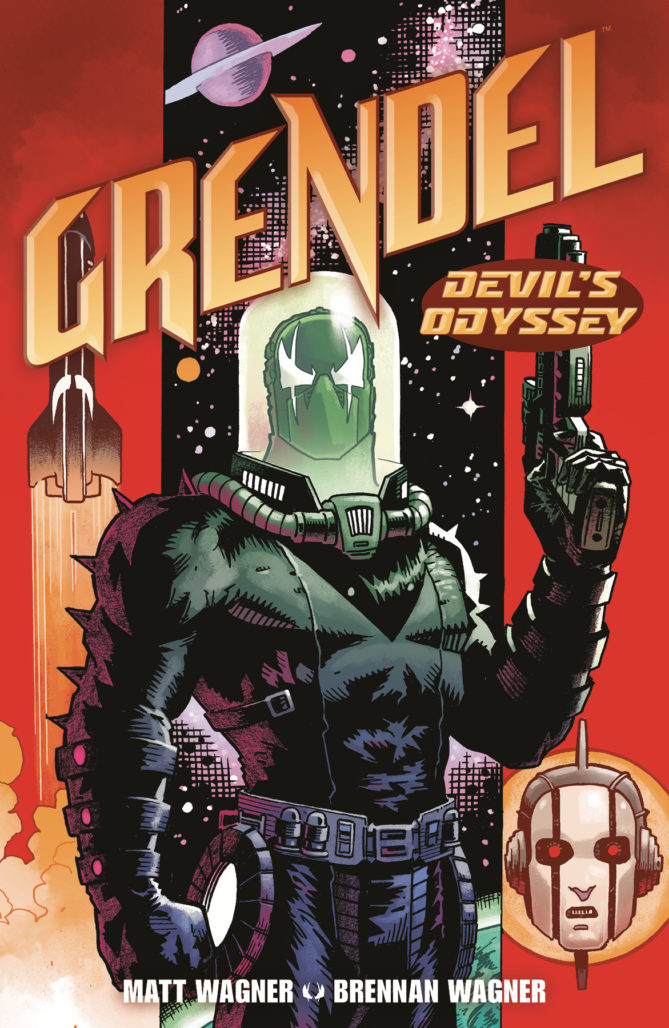
I have a confession to make: up until last month, I’d never read any of writer/artist Matt Wagner‘s Grendel. Sure, I was aware of the series and the character—I remember seeing stuff about it in Wizard Magazine as a young comics fan in the ’90s—but I didn’t know what it was about, and given the amount of history behind it I wasn’t sure where to start. It seemed very intimidating.
When I did finally decide to dive into it, I found that Dark Horse had put out a series of omnibii collecting the series in reading order. Reading the first volume, I very quickly fell in love with the character of Hunter Rose and the noir-infused world that Wagner created for the character. Rose was fascinating, as were the narrative techniques being used to tell his story. Knowing the character’s eventual end from the very beginning also seemed to give every story of the character an air of legend. If all of Grendel had been about Hunter Rose I’d have been more than satisfied.
As I reached the end of the first omnibus and moved into the later volumes, though, the true scope and grandeur of Wagner’s Grendel revealed itself to me. As the mantle of Grendel changed hands, what started out as a crime series became so many other things—a revenge tale , a meditation on mental illness, a reflection on the sins of one’s past, and a dystopian political thriller.
Through it all, though it spans genres and centuries of story, it’s all still distinctly Grendel. Wagner has built a world that is distinctly his. Now, with the new eight-issue miniseries Grendel: Devil’s Odyssey, Wagner takes the sprawling Grendel mythology somewhere it’s never been before: away from Earth. I was honored to have the opportunity to talk to Wagner about the history of Grendel, what inspired this next incarnation of the property, and what might be next for the series.
Joe Grunenwald: I was impressed on reading Grendel: Devil’s Odyssey #1 at how accessible the issue is. Grendel is a concept with over thirty years of history behind it, but you keep coming up with ways to reinvent it and expand on the lore. Is there anything you think readers need to know before going in to the new series?
Matt Wagner: One of the challenges with a long-running narrative that’s as epic as the Grendel saga is that new readers might be put off by the lengthy history that they might feel they’ve already missed. So I’m glad to hear you say that you found this newest entry in the saga to be so accessible. With every new incarnation or installment of the character, I certainly try to style things in such a manner that someone could pick it up fresh and still be intrigued enough by the story at hand to enjoy the current narrative. Hopefully, that interest will be strong enough to lead them to the rest of the Grendelverse and all the many different variations of style and theme we’ve explored over the years.
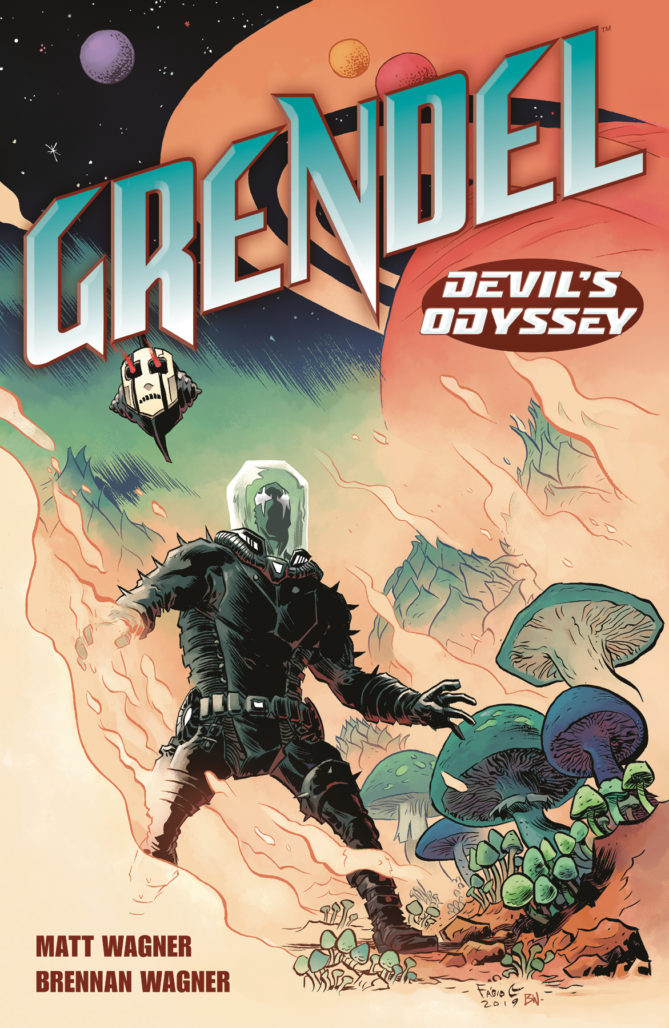
For those fresh to our pages, there’s a brief “Mission Summary” at the beginning of each issue in this new series that briefly helps set things up. And if new readers want to dive deeper into the dark history of the Grendelverse, they can find the entire saga collected in the four-volume Grendel Omnibus editions, available from Dark Horse Comics. There are also two volumes that collect the Grendel Tales series. Altogether, the Omnibus volumes offer nearly 3000 pages of the entire Grendel saga and feature contributions from a litany of the most talented and significant comic artists around; Tim Sale, Mike Allred, Jill Thompson, Kelley Jones, David Mack, Teddy Kristiansen, Paul Chadwick, John K. Snyder, Guy Davis…the list goes on and on. Grendel is a centuries-spanning epic that, as you said, has always been about reinventing its narrative reality while maintaining a central core concept. You never quite know what’s going happen next in the Grendelverse, and I think that’s what helps keep it fresh and exciting.
Grunenwald: Devil’s Odyssey picks up well into the future from where long-time readers left Grendel Prime. When last we saw Prime at the end of Devil Quest, he had accidentally time-travelled (and had a run-in with Batman) while attempting to commune with the spirit of Hunter Rose. How did that experience change Prime?
Wagner: Grendel Prime’s whole story is one of honor and sacrifice…and the continual failure of those ideals. The human warrior who surrenders himself to become Grendel Prime did so out of a fanatic belief in the power and purpose of his ultimate Commander-in-Chief, the Grendel Khan—Orion Assante, ruler of the first global empire and progenitor of the Grendel rank and identity. Charged by the Khan with protecting his only heir from the political turmoil that might result from his own death, Prime has since seen the empire he once loved and defended fractured into a hodgepodge of warring sects and incompetent leaders. As a result, Prime has gone through various stages of increasing isolation from humanity and its affairs. He briefly found companionship with the cynical but still idealistic Grendel warrior, Susan Veraghen, but his cybernetic lifespan outlasted their many adventures together. Since then, he’s wandered a dark and lonely path, willing to do terrible things in the quest to reclaim what he once found sacred.
Prime is the Grendelverse version of the Knight Errant, separated from his own world and forever doomed to never finding the Grail that will complete his mission and heal the world. At this point in the narrative, he hasn’t been seen for nearly a century.
Grunenwald: Will Devil’s Odyssey reveal anything about what’s happened with Prime since the end of Devil Quest?
Wagner: Yeah…we’re going to see plenty of Prime’s history as revealed through some flashback sequences. This is a character’s who’s still a bit of an enigma even though we’ve seen plenty of his adventures, so I thought it fit the story nicely to explore Prime’s inner space even as he explores outer space.
Grunenwald: What inspired you to tell this particular story? The idea of needing to find another inhabitable planet because the old one is no longer usable feels unfortunately somewhat timely.
Wagner: Part of the inspiration for this series was to affect a big narrative shake-up, which has been one of Grendel’s hallmarks since its inception. The future I eventually envisioned in Grendel has basically been a long-lasting second Dark Ages, wherein technology and societal norms basically stall out in a sort of brutal crucible that doesn’t allow humanity to advance or evolve as a race. In Grendel, humankind never really makes that exploratory leap off the planet and instead just stagnates in an endless cycle of codified ritual and continual warfare. Believe me, there are many aspects of Grendel that I find sadly predictive of where we might be headed. But I also thought it was time to redirect the course of how the story’s been running for a while…by at last taking the narrative into outer space for a bit. Like I said, you never quite know what’s gonna happen next in Grendel!
Grunenwald: Grendel has come a long way from where it debuted, crossing formats and genres. Devil’s Odyssey feels like the first Grendel story to really embrace science fiction elements. Sure, Prime is a cybernetic being, but he’s never left Earth before or met an alien race (that we know of). How does removing Prime from the confines of Earth allow you to explore more about the character?
Wagner: Coupled with my desire to shake up the narrative with Devil’s Odyssey, was an urge to pay homage to a bit of comics history that was transformative to my own concept what comics could be and what sort of creator I would one day become. As a young comics reader in the 70s, discovering Heavy Metal in my local magazine racks (as opposed to the more kid-friendly spinner racks) did a lot to stir my imagination beyond the realms of mainstream comics. The more adult subject matter and the fact that most of the stories were serialized and fractured, sometimes even coming to no conclusion, confused the hell out of me on one level but also showed me the vast palette of what comics could accomplish and how varied and different they could appear.
Another aspect of Devil’s Odyssey is that it’s a bit of a play on Gulliver’s Travels, with our cyborg hero visiting different worlds that offer some reflection on how things are/were fucked up back on Earth. And I like the dichotomy of the fact that the paladin that gets sent to explore these other worlds as a final hope for humanity’s survival, is in fact hardly human himself any more. In fact, it’s Prime’s cybernetic framework that makes him the ideal candidate to withstand the rigors of extended space travel and that lets me explore various questions of identity and purpose. Can humankind migrate to other worlds without any of the violent incursions that have marked most of our previous expansions? And is sending a warrior that has so little of his own humanity remaining to explore such a possibility necessarily a good idea? It’s a least a desperate one.
Grunenwald: Did you have any idea when you started that initial Hunter Rose story how sprawling the Grendel saga would become? Was it something that took on a life of its own?
Wagner: I always had an open attitude towards Grendel as both a concept and a narrative and that’s what eventually led to its lengthy and multi-textured history. But, no…I never had any of this vast saga planned out in advance. Because, c’mon…how boring would that be? Part of the fun in keeping things lively and fresh is to envision a long blank canvass stretching out ahead of where the story is at any given point. That makes it so that anything’s a possibility.
As a fledgling creator, I hadn’t initially conceived of extending Grendel past the original storyline, Devil By The Deed. But once I decided that continuing beyond Hunter Rose’s storyline was an intriguing idea, I knew that I had to do something to keep these stories vital and compelling. I knew I had to keep things interesting for me if I was ever going to manage to keep things interesting for my readers. And the only way I could see to do that was to continually reinvent not only the character but also the style, tone and motifs of the series as it progressed. We even retool the logo for each incarnation of Grendel…still the same basic letterforms, but rendered differently to reflect that new particular version of the character’s persona.
Grunenwald: I’d be remiss if I didn’t ask you about former Comico owner Andrew Rev, who’s been back in the news recently due to a dispute with Rob Liefeld related to the rights to Youngblood. As someone who had a similar situation in the early ‘90s, and who fought long and hard to get the rights to both Grendel and Mage back from Comico/Rev, do you have any thoughts on Rev’s new venture, Terrific Productions, or on the situation between he and Liefeld?
Wagner: I’d have to confess that I’m not even remotely informed enough on the situation to make any sort of accurate comment. Obviously, I’m a firm and uncompromising proponent of creator’s rights to their own artistic efforts. My own experiences trying to defend and retain those rights over the years have been both exhausting and frustrating to say the least…and I hope fewer and fewer of my fellow creators ever have to suffer through the same bullshit. I wish Rob the best.
Grunenwald: Any final teases for what’s to come in Devil’s Odyssey or the overall future of Grendel?
Wagner: Well, the ending of this series sets up a whole new direction for the next leg of our epic narrative. But again, this is Grendel…so that’s no big spoiler.
Written and illustrated by Matt Wagner, colored by Brennan Wagner, and published by Dark Horse Comics, Grendel: Devil’s Odyssey #1 is due out digitally and in comic shops on October 2nd.


